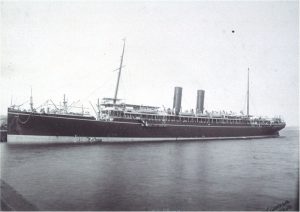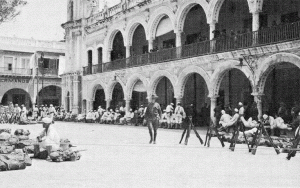For most of my professional life, I worked as a reporter and foreign correspondent for the Chicago Tribune. I feel privileged to have been a journalist during one of that newspaper’s golden eras—from about 1969 to 1997 when I left to teach journalism as a professor and dean at the University of Illinois in Champaign-Urbana.
Since leaving the University of Illinois in 2010, I have spent my days producing this blog and writing fiction. The transition from journalism to fiction is never wholly seamless. While journalism taught me essential writing skills, such as the economy of words, the value of detail, keen observation, and fundamentals such as pacing, transition, and good storytelling, writing fiction requires you to develop new skills.
You need to create a sound and believable plot and develop strong characters who can carry your story forward and with whom your readers can identify or empathize. You also need to be adept at description—though not to the point of distraction. Too much description will bog your story down.
Most of all, you don’t want to make your reader work too hard. Readers should be able to move through your story with ease and anticipation. You want them to turn the pages eagerly, not reluctantly.
For those of us who write for a living (or just for the hell of it), nothing is more critical than compiling honest and, hopefully, positive reviews of our work. A review by a professional reviewer is worth its weight in rare earth metals—especially when that reviewer “gets” the story, your characters, and what you are trying to say if you happen to have a message buried somewhere in your prose.
In my case, one of my favorite professional reviewers is Carrie Meehan, Senior Reviewer for Chanticleer Book Reviews. Carrie read each book in the Finding Billy Battles Trilogy as it was published over five years. She “got” the story I was telling and understood the characters and their struggles—especially the main protagonist, Billy Battles.
Here are Carrie’s three reviews. You will immediately see how well she grasped the plot and characters if you have already read the trilogy. For those who haven’t read the trilogy, perhaps Carrie’s reviews will inspire you to do so. In any case, I would love to hear your thoughts. If you read the trilogy, please let me know your opinions via an Amazon or Goodreads review.
Review of Book 1
CHANTICLEER BOOK REVIEWS. FOR RELEASE & DISTRIBUTION. REVIEW (900 words) of: Finding Billy Battles: An Account of Peril, Transgression, and Redemption (Book 1 of 3; Author: Ronald E. Yates ; Publisher: California Times Publishing; 1 edition (2016) ISBN-13: 978-1494854447; ASIN: B01LBTOMYS; Rating: 5/5
“Brilliant first book in a literary series about a man who lives life to the fullest and finds himself along the way.” Carrie Mehan, Chanticleer Reviews
The best way to experience history is to ride along with someone who lived it. Author Ronald E. Yates allows us to do just that by cleverly inserting a story within a story in his spectacularly captivating novel, Finding Billy Battles.
The title character’s great-grandson, Ted Sayles, greets the reader in the novel’s prologue and explains how he came to be in possession of journals, letters, recordings, and other autobiographical materials of his great-grandfather. William Raglan Fitzroy Battles lived an entire century, from 1860 to 1960, and his wish was that Ted “…help me set the record straight about some things I did, people I met, and some events I witnessed.”

And what a tale it is! One chock full of the peril, transgression, and redemption noted in the subtitle. Ted makes the astute choice to allow Billy to address the reader directly, thereby giving immediacy and intimacy to this account of his childhood, young adult years, and early manhood. Hitch up your saddle because you are in for the ride of your life!
Billy, also referred to as “William,” was born in Ford County, Kansas, in 1860. His parents had been part of a wagon train heading to the western territories. Billy’s father fought for the Union during the Civil War and died on the battlefield. His mother, an ardent abolitionist with a flair for dressmaking, raised Billy in Lawrence, Kansas, and insisted he attend the new university for a couple of years when he came of age.
Sensing her son’s restlessness, she allows him to travel to Dodge City, that “notoriously wild cow town,” to work on the Dodge City Union newspaper for a summer. It’s a significant experience, and William will remain a journalist his entire life, learning about the business from the bottom up. His journalist’s eye will allow him to observe and assess what others might miss entirely. The same is undoubtedly true for Ronald E. Yates, an exceedingly talented journalist. The events in this book are carefully considered from every possible angle and relayed with admirable objectivity.
However, journalism won’t be William’s entire life because of crucial people and pivotal events that will shape his years. He interacts with noted figures of the time, including the taciturn yet quietly charismatic Wyatt Earp, the gregarious showman and owner of the Crystal Palace Saloon, Bat Masterson, and that famous dentist, Doc Holliday, whose quick, sardonic wit was far stronger than his body, which was slowly surrendering to consumption. Such company is enough to make a young man forget ever returning to conventional life in Lawrence and continue studies at the University of Kansas.
While William won’t be a part of the famous battle at the OK Corral (which, he tells us, actually took place in a vacant lot behind the Corral), he has his own shoot-out, one that will plague him almost his entire life. While visiting his family’s old homestead, he and his companions discover squatters, the Bledsoe clan, on the property. One thing leads to another, and events reach a fevered pitch with kidnappings, escapes, and, finally, William inadvertently shooting someone while defending himself from others. It shakes the young man to his core. Because of his connections with Earp and other lawmen, his version of events is believed, but that’s never the end of the story in the Wild West.

Vengeance has an arm longer than the law, and it will reach for William again and again. As a result, his courtship and marriage to Mallie McNab, a banker’s daughter in Denver, are impacted, as are his relations with his mother and young daughter. Can William weather it all, or will he flee to foreign lands and encounter adventures of a different kind?
At a dark point, William notes, “…my life descended wildly into a morass of adversity and peril.” It’s a statement worthy of Charles Dickens. Our protagonist, once indeed a young man with great expectations, now must decide how to make life worth living. Thank heavens there are two more books in this series, The Improbable Journeys of Billy Battles and The Lost Years of Billy Battles. We must know how it all turns out, and William has more than six decades yet to live.
With precise and fully realized characterizations, Ronald Yates will draw readers in immediately as they become aware of the will and grit it took to carve out a life on the frontier and the courage necessary to live in a place like Tombstone, amongst people ready to settle any disagreement with a gunfight. Not all scenes take place in boomtowns and saloons, however. We’re also treated to alluring details of lovely rooming houses and majestic hotels, including the Grand and Tremont House hotels.
The reader gets an almost literal taste of savory meals served in private homes and the finest restaurants of the day. Most fun are the scenes at the Columbian Exposition in Chicago in 1893, where William and his wife tour fascinating exhibits at Marshall Field’s Wholesale Store and learn that the Palmer House Hotel is now lighting its rooms with electricity!
It’s all marvelous and so artfully described that readers may envy the characters. It’s a rare and talented author who can achieve this, and it’s not hard to imagine Billy, Bat Masterson, Doc Holliday, and the Earp brothers tipping their hats to Ronald E. Yates. Highly recommended.
NOTE: Finding Billy Battles, Book 1, was a finalist for the Laramie Award, the New Apple Award for historical fiction, and the winner of the Book Excellence Award.

Review of Book 2
Chanticleer Review. Title: Improbable Journeys of Billy Battles, Book 2 of the Finding Billy Battles Trilogy Author(s): Ronald E. Yates Genre(s): Action Adventure, European, Historical Fiction, War Publisher: XLIBRIS; 1 edition (2016) Rating: 5/5
“Ronald E. Yates continues the robust adventures of a lawman, gunslinger, and journalist in The Improbable Journeys of Billy Battles, the second volume in his trilogy about the title character.” Carrie Mehan, Chanticleer Senior reviewer)
As in the first volume of the trilogy, William “Billy” Battles addresses the reader, but Ted Sayles, Billy’s great-grandson, is the one who compiled Billy’s life story through studying his great-grandfather’s journals, letters, newspaper articles, tapes, and other materials. And what an adventurous life it is! Living a full one hundred years, William Fitzroy Raglan Battles was born in Kansas in 1860 but eventually travels the world. Readers familiar with the first volume will no doubt want to continue William’s journey with the second book, which begins in 1894.
However, The Improbable Journeys can function as a stand-alone volume because Yates takes great care to bring the reader up to speed with what has already occurred.
The opening chapters of Book 2 find William aboard the SS China, bound for French Indochina, although the ship will make stops along the way. He is grieving the loss of his beloved wife and seeks to assuage that grief with travel, leaving behind his mother and young daughter, Anna Marie. However, the Pinkerton Detective Agency is hot on his trail, investigating William’s part in the deaths of members of the Bledsoe family back in Kansas.
His future is also set in play when he meets Baroness Katharina von Schreiber, a brilliant intellectual who, despite her aristocratic German title and surname, was born and raised in Chicago. Like William, her spouse is dead, but the circumstances involving Rupert’s death are suspicious, and she takes great pains to avoid questioning by the authorities.

William learns that some officials believe she’s in possession of top-secret German documents that she confiscated from her husband. There’s much political intrigue, but Katharina and William delight in each other’s company, and he feels the first stirrings of romance since his wife’s death.
William’s journeys bring him face-to-face with the realities of late 19th-century colonialism. As an American traveler and journalist, native peoples expect him to sympathize with their struggles against colonial powers. After all, America set the example for the rest of the world by throwing off the chains of England more than one hundred years earlier.
In the Philippines, Katharina’s brother, Manfred, supports a secret organization that seeks to overthrow colonial rule and establish national independence. While William has great admiration for the Philippine revolutionary leader, Aguinaldo, he is coaxed into military service. He fights alongside American soldiers from Colorado and Kansas—even though he knows all too well that McKinley’s “Proclamation of Benevolent Assimilation” is not truthful; the U.S. ultimately annexes the Philippines not as “friends” but as invaders and conquerors.

These fascinating chapters are narrated with an experienced journalist’s objective and encompassing eye. Yates, also a journalist, does an exemplary job of having William note every angle of colonialism’s despotic nature and the vast and complex difficulties involved in native peoples’ achieving independence.
The book is not without humor. William is witty and candid, occasionally sliding into cowboy-speak, and he knows a cast of characters, real and fictional, who provide surprising hilarity throughout the book. Bat Masterson is on hand, as is Jefferson Randolph “Soapy” Smith. We leave William anticipating more dangerous exploits, one involving Francisco Villa, better known as “Pancho Villa.” Thank heavens, this is a trilogy because it’s clear Billy Battles adventures are far from over.
NOTE: The Improbable Journeys of Billy Battles won first place in the 2016 Chanticleer International Book Awards in the Somerset Literary category.

Review of Book 3
Chanticleer Book Reviews.Title: The Lost Years of Billy Battles, Book 3 in the Finding Billy Battles Trilogy ; Author(s): Ronald E. Yates; Genre(s): Historical Fiction, Literary Fiction, War Publisher: Mill City Press; 1 edition (2018)
Reviewers note: I’ve begun few books as eagerly as I did this one. Having read the first two volumes of Ronald E. Yates’ extraordinary trilogy, Finding Billy Battles, I couldn’t wait to continue his story in the final volume, The Lost Years of Billy Battles. The third installment met the exceedingly high standard set in the first two volumes. Billy Battles is as dear and fascinating a literary friend as I have ever encountered. I learned a lot about American and international history, and you will, too, if you read any or all of the books. Each is an independent work, but if read in relation to the others, the reader experiences that all too rare sense of complete transport to another world, one fully realized in these pages because the storytelling is so skillful and thoroughly captivating. Trust me; you’ll want to read all three volumes. (Carrie Meehan, Senior Reviewer)
For those not familiar with the series, Yates presents his books as works of “faction,” a story “based in part on fact” but also “augmented by narrative fiction.” The protagonist, William Fitzroy Raglan Battles, born in Kansas in 1860, lives a full 100 years and takes part in some of the most significant events of his time. He encounters key figures of the day (Bat Masterson Wyatt Earp, President Wilson, Francisco “Pancho” Villa, among others), gives us their backstories, and quietly appraises them.
Yates, a journalist with a keen eye for nuance and subtlety, has created a protagonist with superb critical thinking skills. William, a journalist and occasional soldier, examines people and transactions from every angle. Just as at ease in a Kansas saloon, as he is at the captain’s table on a grand ocean liner on the Pacific, Billy Battles is also ruthlessly honest about his shortcomings and feels tremendous guilt when he acts impulsively or inadvertently causes harm to others. Yates has crafted a fully human character who is easy to admire, perhaps because he is admirably cognizant of his own flaws.
This installment of the trilogy opens with William enjoying middle age in Chicago with his second wife, his beloved Katharina, a former German baroness, and his daughter, Anna Marie, now a student at Northwestern University. It is 1914, and World War I is raging in Europe. Germany, late to the spoils of colonialism, is seeking to make up for lost time with its policy of Weltpolitik, which advocates for imperialist expansion.

When William is contacted by his friend and former military associate, General Freddy Funston, who informs him that a German merchant ship is bound to Mexico to deliver arms and munitions to its dictator, General Victoriano Huerta, William and Katharina travel to Mexico and pose as tourists while trying to find out as much as possible about the shipment. They learn that the ship is carrying a fortune in gold and silver bars in addition to weapons. Further investigations reveal that Germany hopes to convince Mexico to engage in skirmishes along the U.S. border, creating enough havoc that America will sit out the war in Europe and thus allow Germany expansionist gains there.
Although in Mexico at the behest of the U.S. military, William and Katharina readily understand why Mexicans feel hostile to Americans; a significant portion of the Southwest used to belong to Mexico. However, President Wilson does not recognize Huerta and is all too eager to engage in big-stick diplomacy when he chooses. Also, many Mexicans are desperately poor, the Campesinos working as virtual slaves on haciendas for no pay. It’s not surprising that they cheer on Venustiano Carranza, leader of the Northern opposition Constitutionalists charismatic lieutenants, the intense, intelligent Zapata who yearns to bring about land reform for the poor, and the wild but charismatic Pancho Villa who sparks outrage when his men murder 17 Texas mining engineers.
The U.S. military decides to intervene, and once again, William is pressed into service, this time with General Pershing and the General’s aide-de-camp, George S. Patton. While the U.S. Army has the latest in weaponry and travels with motorized vehicles and untrustworthy aircraft, the new technology causes a lot of noise, making it difficult to sneak up on Villa and his light-footed army, one that’s thoroughly familiar with the terrain and beloved by the people. William’s observations and reporting on all of this for his Chicago newspaper are riveting and wryly amusing.

Following this Mexican adventure, William barely has time to catch his breath when his past catches up with him again. Mason Bledsoe, the son of the man William killed due to complex circumstances when he was just nineteen, abducts Katharina. With the help of his cousin, William determines his wife’s whereabouts and attempts to free her, as well as seek vengeance on those who kidnapped her. The results of his actions necessitate his leaving the country for his safety and, more importantly, in his mind, his family’s safety.
Over the next decades, he will spend time in the Philippines and Indochina, where he will again grapple with the blatant injustices of colonialism, aggrieved by the plight of native men working 16-hour days on French rubber plantations in intense heat, their flesh bitten and eaten by mosquitoes, oxflies, and army ants.

While abroad, William’s personal life takes some shocking turns that motivate him to return to the U.S. in 1936. His final years in Kansas, his birthplace, are the quietest of his life. Billy often muses on all he has seen and experienced. When he meets his great-grandson, Ted Sayles, he decides to bequeath him his guns, uniforms, journals, and correspondence. In the Epilogue, Ted addresses the reader and shares his thoughts about some shocking surprises he finds amongst William’s papers. It’s a most satisfying conclusion to an extraordinary trilogy.
At his behest, William’s grave includes the simple statement, “He did his best.” The same is undoubtedly true of the author, Ronald E. Yates. The research involved in putting William’s story on the page must have been immense. In addition to carefully plotting history, the details he weaves into his prose regarding fashion, food, weather, social class, and technology make this the richest account of a life imaginable.
The Lost Years of Billy Battles won the Goethe Grand Prize for historical fiction , the Best Overall Grand Prize for Book of the Year from the Chanticleer International Book Awards, and the New York City Big Book Award.

–30–
If you enjoyed this post, please consider subscribing to ForeignCorrespondent and tell your friends to subscribe. IT’S FREE! WHAT A DEAL! If you’ve received this from a friend and would like to be added to our distribution list for future blog posts, please enter your email address in the sign-up in the notifications box at:
https://ronaldyatesbooks.com/category/foreign-correspondent.
You can also find my commentaries on Substack at https://ronyates.substack.com/ and the American Free News Network at https://afnn.us.
Please feel free to comment. WE LOVE COMMENTS!

